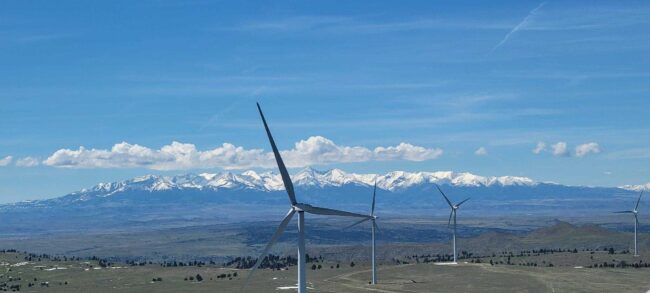
Turbines in Big Timber are safe from aggressive legislation… for now. Photo by Bradley Wyss.
by Nick Fitzmaurice
MEIC is taking stock of changes in the energy landscape coming out of the Legislative Session. Here’s a rundown of the energy bills MEIC was tracking.
Renewable Energy
Possibly the greatest proactive win for clean energy this session would be the passage of SB 188 (Sen. Chris Pope, D-Bozeman), the Montana Solar Shares Act. As of this writing, the bill has not yet made it to the Governor’s desk, where it will have to clear its final hurdle to becoming law. SB 188 would enable households and businesses to subscribe to shares in a community solar generation project and receive monthly credits on power bills. The benefits of solar would be made available to households and businesses who otherwise cannot invest in their own solar array due to property limitations, status as renters, or financial constraints. This legislative success would not have been achieved without the incredible leadership of MEIC’s partners at the Montana Renewable Energy Association and the Northern Plains Resource Council.
Clean energy also saw other wins, including the codification of solar consumer protections in HB 760 (Rep. George Nikolakakos, R-Great Falls). Another good bill is HB 31 (Rep. Neil Duram, R-Eureka), which clarifies and refines wind and solar bonding and decommissioning requirements.
The anti-wind sentiment encountered in the first half of the session was mostly assuaged in the second half. Sen. Bob Pahlen’s (R-Lindsay) anti-wind SB 160, SB 283, and SB 505 all stayed dead, as did HB 389 (Rep. Brandon Ler, R-Savage). These bills would have been so restrictive, they would have driven the wind industry out of the state. HB 915 (Rep. Jerry Schillinger, R-Circle), which would have doubled the property tax rate on wind generation facilities, did not make it out of committee in the House. As a concession, Rep. Katie Zolnikov (R-Billings) was able to pass HB 939 with some reasonable setback requirements between wind turbines and occupied residences.
NorthWestern’s Wish List for Planning & Regulation
In addition to its shenanigans on data centers (see article on pg. 23), there were a few other bills that addressed concerns of NorthWestern. HB 55 (Rep. Gary Parry, R-Colstrip) was the result of a special legislative interim committee proposed by NorthWestern Energy in the 2023 Legislative Session. As introduced, the bill contained a long list of problems, largely related to public participation and transparency in NorthWestern’s Integrated Resource Planning (IRP) process. MEIC worked extensively to secure amendments that addressed our concerns. The final bill improves public participation and transparency, while creating additional oversight for NorthWestern’s acquisition of new energy resources.
HB 490 (Rep. Amy Regier, R-Kalispell), NorthWestern Energy’s wildfire liability bill, was improved by amendments but remains fatally flawed. It requires the unqualified Montana Public Service Commission (PSC) to approve a utility’s fire mitigation plan if it is “in the public interest,” but it doesn’t give the PSC sufficient time or resources to conduct that review. It also shields the utility from significant liability if it causes a wildfire because they can only be held liable if they didn’t follow the best practices of similar utilities in Montana, thereby barring comparisons to better utility management in other states. Essentially, if NorthWestern’s actions caused a fire — like the one it caused that burned down the town of Denton —NorthWestern’s actions cannot be compared to more reasonable and responsible utilities that made efforts to prevent such catastrophes.
Electric Vehicles & Public Transportation
As always, bills addressing electric vehicles (EVs) and transportation were a mixed bag.
HJ 12 (Rep. Randyn Gregg, R-White Sulphur Springs) was a resolution fraught with misinformation about EVs. After a spirited hearing, it languished and eventually died in the committee. SB 228 (Sen. Denley Loge, R-Saint Regis) started out as a clean-up bill for the Senator’s 2023 EV bills (HB 55 and HB 60). Unfortunately, the bill was amended to eliminate a 30% registration fee reduction that was supposed to go into effect in 2028 to address a double taxation of EVs.
Transportation bills fared a little better. SJ 19 (Sen. Andrea Olsen, D-Missoula) creates an interim study on improving public transportation in Montana. HB 764 (Rep. Brian Close, D-Bozeman) will make it easier to create or expand urban transportation districts on the initiative of a local Commissioner (see article on pg. 18). Unfortunately, the bill to support Big Sky Passenger Rail Authority’s (BSPRA) revival of passenger rail across southern Montana failed on the Senate floor. HB 848 (Rep. Denise Baum, D-Billings) would have appropriated $2 million each year for the project, which has received numerous grants and broad support in Montana.
Other Energy Bills
HB 326 (Rep. Gary Parry, R-Colstrip), as originally written, would have lowered the severance tax on coal extraction while establishing a punitive 10% “energy severance tax” for all non-coal energy generation (wind and solar). This bill was resurrected after transmittal with amendments to leave the coal severance tax alone and apply a 2% “severance tax” on non-coal energy generation only to thankfully fail second reading on the House floor shortly after.
Unfortunately, HB 122 (Rep. Larry Brewster, R-Billings) passed, overriding local jurisdictions by giving utilities default public right-of-way access for dangerous gas pipeline development. Another rotten resolution that snuck through was HJ 17 (Rep. Steve Fitzpatrick, R-Great Falls), which calls for an end to effectively all federal environmental rules and regulations pertaining to our energy system.
HJ 54 (Rep. Seekins-Crowe, R-Billings) was a late and baffling resolution that would have encouraged harmful garbage incineration for energy production. Luckily, it died on the Senate Floor.
This article was published in the June 2025 issue of Down To Earth.

